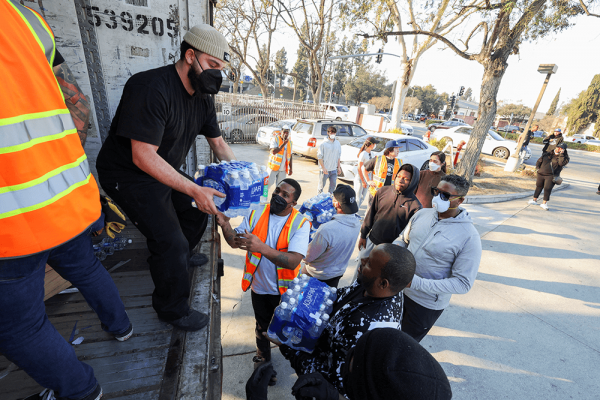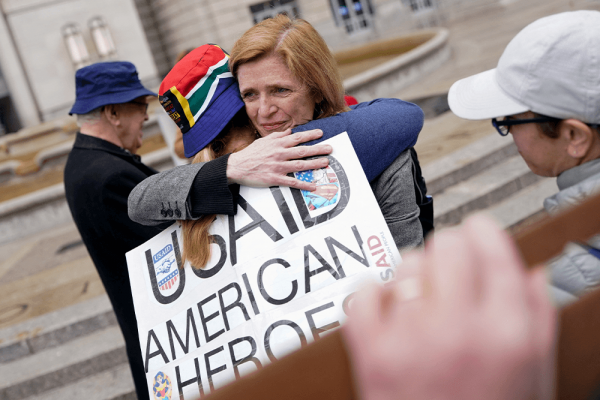Sometimes the church can feel hopelessly divided: Disagreements around sexuality are splitting apart Protestant denominations in the U.S. and around the world. Russia’s invasion of Ukraine has further divided the Orthodox Church. The Catholic Church continues to face fallout over its handling of sexual abuse and schisms over Pope Francis’ hopeful efforts to create a more inclusive church. But while the church’s divisions tend to grab headlines, I’ve noticed that examples of unity within the body of Christ often go unnoticed.
When I say “Christian unity,” what I mean isn’t “Christians should all just agree” or even “Christians should ignore our real differences in doctrine and tradition.” Instead, what I mean by “Christian unity” is that when we center our shared identity in Christ — notwithstanding our differences — we can generate trust and build relationships that bear real fruit, increasing cooperation within the church to address challenges in the world. And I say this knowing that there are often many good reasons why Christians are not unified, including differing views on issues that cut to the heart of our faith, such as our interpretation of scripture, what we believe about the role of baptism, and vastly different governance structures, as well as differing views around contentious issues such as abortion and sexuality. But Christian unity is still worth pursuing because it ultimately strengthens our collective witness, advancing the love of God and work of justice.
Last week, I had the privilege of seeing glimpses of that kind of Christian unity in action. As president of Sojourners, I traveled to Accra, Ghana for the Global Christian Forum, a gathering that “seeks to offer new opportunities for broadening and deepening encounters” between members of different of churches and inter-church organizations. Started in 1998, the GCF fills a gap in the ecumenical movement by trying make an extra effort to include churches — such as charismatic traditions, African-instituted churches, migrant churches, and megachurches — that haven’t always felt included or accepted in other ecumenical spaces. This year, I was especially inspired to hear from nearly 30 younger Christian leaders who participated in a pre-forum gathering supported by Sojourners and were embraced as full participants in the forum itself.
It feels appropriate that this forum took place in sub-Saharan Africa, which is predicted to be home to 40 percent of the global Christian population by 2060. Walking into the Ridge Church conference facility reminded me of what it feels like to walk into the headquarters of the United Nations in New York, with people of nearly every nationality, race, and ethnic background mingling and engaged in conversation. Our time together was also filled with rich liturgy and beautiful music, capturing the breadth of cultures and traditions within the global church — from a Ghanian praise song that we returned to throughout the gathering, to Black freedom spirituals and classic Protestant hymns.
The GCF has two key goals: foster mutual respect and explore our common concerns together. To encourage the former, the forum revolved around small group conversations in which each member shares their own faith story. My own small group included Christian leaders from China, Zimbabwe, Sweden, Ghana, Canada, and Russia. We offered each other vulnerable details of our own faith journeys, including times of uncertainty and struggle; many of us had wrestled with (and ultimately embraced) a call into ministry and our deep encounters with God’s redemptive love and grace. Sharing your faith story — or as we call it in my Black Baptist tradition, your testimony — has a disarming and humanizing effect. We found ourselves developing a sense of kinship, enabling us to reflect together on challenging issues facing both the church and the world. The statement released at the end of the gathering put it well: “To share our personal stories is to witness to the resurrection of Christ together.”
Bearing witness to our shared experiences of rebirth and renewal is an essential part of Christian unity. Story-sharing helps us see that while our doctrines and theology differ, we still share an ongoing relationship with Christ — a vertical relationship that then inspires and calls us into deeper horizontal relationships with others. This emphasis on what binds us together shouldn’t minimize the significant differences in tradition and doctrine that separate the major branches of the church. Instead, we can recognize these differences as an opportunity to learn, be stretched, encourage, and lovingly challenge each other as we work together to advance God’s reign of justice and peace.
Christianity is so often known for what it’s against rather than what it is for, but my experience at GCF reminded me that ecumenism is not optional; it’s essential for the credibility of our witness and the church’s ability to affect positive change.
But Christian unity is never an end unto itself. Throughout GCF, we drew on Jesus’ words in John 17, in which Jesus prays earnestly that that his disciples would be one with each other “to let the world know that you sent me and have loved them even as you have loved me” (17:23). In this passage, we see that Christians aren’t to strive for unity because it’s “nice,” but because that kind of oneness tells the world something powerful about who God is; it’s inextricably linked to mission, our outward witness, and action.
In his remarks to the forum, Rev. Jerry Pillay, general secretary of the World Council of Churches, echoed the connection between ecumenism and mission: “Our world needs a spiritual and moral renewal; it needs us to speak prophetically and with one voice to the challenges of our times, and we can succeed by constantly allowing the Holy Spirit to work in us and with us and through us to transform the world.” While the GCF is not a formal body that makes public statements or advocates around particular issues, speakers in the forum addressed a range of pressing issues including the horrific war in Gaza, the global migration crisis, and Christian persecution. We heard from leaders who imagined what the church could do if we united — despite our differences — on issues of peacemaking and combatting poverty and oppression.
During the forum, we spent a full day journeying together on a pilgrimage of lament and reconciliation to visit one of the “slave castles” on the Cape Coast where millions of enslaved Africans were held before being forced onto ships and sold across the Atlantic. It was jarring to see a church built on top of the dungeon where Africans were brutalized — and many died — before the survivors were shipped to the Americas as slaves. Standing in a place where Christians worshipped God while unconscionable suffering took place beneath them, I was reminded how often the church has been complicit with or perpetrated evil, including the more subtle ways that the church continues to ignore grave suffering and injustice in its midst today. And yet, I was also reminded that the church played a key role in initiating a moral campaign against slavery that ultimately led to the end of the transatlantic slave trade. We ended our pilgrimage with a worship service at a nearby Methodist church nearby, where we shared prayers of lament and pledged our commitment to dismantle racism and end modern-day forms of slavery.
Investing in Christian unity is critical both globally and within our national contexts, a challenge that I’m hopeful the Forum can further advance. My experience at the Forum reminded me of the annual conference of Christian Churches Together, which brings together a similarly diverse cross-section of the church and also emphasizes the power of sharing faith stories. Through CCT, I have witnessed firsthand how relationships built across Catholic, Orthodox, Mainline Protestant, and evangelical leaders have strengthened the witness of the church. Many relationships that were built in the early years of CCT helped to lay the groundwork of trust and mutual respect that contributed to the formation of the Circle of Protection, an ecumenical coalition that Sojourners co-created in 2010 to prevent steep cuts that were being proposed to federal programs that benefit and protect low-income Americans. The group remains one of the strongest ecumenical coalitions advocating for federal funding for programs that fight poverty both in the U.S. and around the world.
I’m hopeful that the relationships, trust, and mutual respect that have been built and strengthened at the GCF can help to mitigate future conflicts and even prevent future wars in which religion has been — and still is — misused to justify inaction or violence. Imagine the impact a more united global body of Christ could have in addressing some of the most pressing global challenges, from the climate crisis to the growing migration and refugee crisis to the threat of authoritarianism and religious persecution and extremism. This will require that we lean into some of the harder conversations about what divides us, even as we center what binds us together. And by working together to address common concerns, despite our differences, we can spread God’s love and advance God’s reign of justice and righteousness.
Got something to say about what you're reading? We value your feedback!







